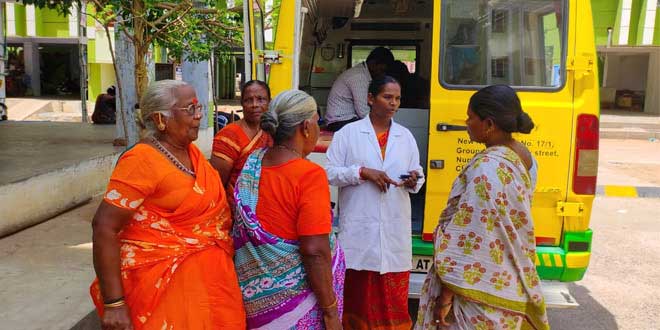( October 16, 2019 )
Smile on Wheels in Chennai’s Pattinambakkam and Velachery block is addressing to the primary healthcare needs of the poor by offering free, door step medical facilities

New Delhi: “I remember in 2016 I saw a van standing close to my house, on enquiring I was informed it is a mobile medical unit van called Smile on Wheels, present in our village to address our medical needs that too free of cost. The medical van came as a blessing for people like me who can’t afford private hospitals and going to government hospitals means taking a day off from work”, says 30-year-old Jaya from Mattan Kuppam village in Chennai, while speaking to NDTV. Jaya is one of the many villagers reaping benefits of NGO Smile Foundation’s Smile on Wheels initiative launched in the city in 2015.
Smile on Wheels is a custom-tailored mobile medical unit van, armed with modern equipment, a doctor and qualified nursing attendant on board, made available to cater to the primary healthcare needs of beneficiaries. The mobile van addresses three challenges – accessibility, affordability, and unavailability by providing free of cost, door step consultation, basic medical check-ups and follow up medicines.
Smile on Wheels, mobile medical unit van, providing free healthcare at doorstep
Talking about getting free medical treatment, elated Jaya belonging to anglers community says,
Be it cold and cough or stomach ache, I and my family reach out to the doctor at SOW. One of the major problems I had was UTI (Urinary tract infections) which has been completely eradicated through medication and counselling.
In September 2015, Smile Foundation with the help of Ericsson Global India Pvt. Ltd. introduced Smile on Wheels in Pattinambakkam and Velachery block of Chennai, covering 20 villages and since then it has been meeting villagers for all their medical needs. Talking about the selection of project location, Santanu Mishra, co-founder and trustee, Smile Foundation, says,
Whenever we start a new project, the broader location like Chennai is selected by the donor. In the second step, urban settlement or a particular community is identified by assessing the current status of healthcare – need, accessibility and availability, population, size of the families, number of bread winners in a family, their occupation, among others.
One Medial Unit, 20 Villages: How Smile On Wheels Addresses Primary Healthcare Needs
As per the information shared by Vignesh, project coordinator, one mobile medical unit van has been allotted for the two target blocks in Chennai. The medical van covers five villages in a week (Monday to Friday) which means, it visits every target village once a month. With an aim to reduce the out of pocket health expenses by urban slum dwellers, the mobile van provides free healthcare – check-up and medicines usually for 7-10 days. In case a patient needs long term treatment, the medical practitioner (from SoW) refers him/her to a better hospital.
Explaining how do villagers get to know about the arrival of SOW, Jaya says,
The days are fixed like for our village Mattan Kuppam it is the first Monday of every month. Also, on its arrival, ANM (Auxiliary Nurse Midwifery) informs and mobilises us.
In the last four years, the SoW in Chennai has reached out to over 1.5 lakh (1,54,834) people in the villages and has impacted 66,261 beneficiaries through 1,008 OPD (outpatient department) session, as of August 2019.
Sharing her experience of availing healthcare facilities from SoW and why she chooses it over government hospitals, 50-year-old Kalai Selvi says,
I dread going to a government hospital for three reasons: it is 5 kms away, the usual waiting time is of 5 hours (approximately) and standing in long queue increases my blood pressure (BP). Through SOW, in the last six months, I have got my health check-up done on a regular basis, treatment for headache, body ache and fever and even a face mask for my smoke allergy.
Talking about providing healthcare, Satnam Singh, head, health vertical at Smile Foundation, says,
Most of the patients coming to us are women in their reproductive age group of 18-45 years. While gynecological problems are by far few, the maximum disease burden comes from lifestyle ailments like diabetes, arthritis and respiratory tract infections.
The team working in Chennai tried identifying top symptomatic ailments in MattanKuppam in Pattinambakkam Block and the findings majorly revealed the prevalence of lifestyle diseases like respiratory problems, diabetes, skin, anaemia, muscular skeletal system, alimentary tract infections and other infectious diseases. Talking about the reason behind the rise in lifestyle diseases, Santanu Mishara says,
Lifestyle diseases are not restricted to the rich populations alone. The diet pattern of a community is responsible for this sharp rise in diabetes and hypertension. A leaning towards carbohydrates, sugars and fats in the diet is responsible for this growing trend of non-communicable disease burden in this part of the country. As part of our programme, doctors and paramedics often hold awareness sessions on lifestyle diseases, sexually transmitted diseases, the importance of nutrition, right eating and sanitation among other things.
Community outreach is a crucial component of Smile Foundation’s health initiative and the team aims to continue with it to inculcate health seeking behavior in the community.